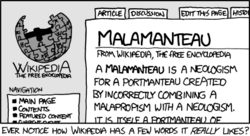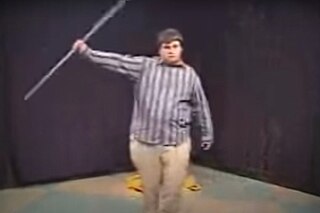References to Wikipedia
Wikiality
In a July 2006 episode of the satirical comedy The Colbert Report, Stephen Colbert announced the neologism "wikiality", a portmanteau of the words Wiki and reality, for his segment "The Wørd". Colbert defined wikiality as "truth by consensus" (rather than fact), modeled after the approval-by-consensus format of Wikipedia. He ironically praised Wikipedia for following his philosophy of truthiness in which intuition and consensus is a better reflection of reality than fact:
You see, any user can change any entry, and if enough other users agree with them, it becomes true. ... If only the entire body of human knowledge worked this way. And it can, thanks to tonight's word: Wikiality. Now, folks, I'm no fan of reality, and I'm no fan of encyclopedias. I've said it before. Who is Britannica to tell me that George Washington had slaves? If I want to say he didn't, that's my right. And now, thanks to Wikipedia, it's also a fact. We should apply these principles to all information. All we need to do is convince a majority of people that some factoid is true. ... What we're doing is bringing democracy to knowledge. [2]
According to Stephen Colbert, together "we can all create a reality that we all can agree on; the reality that we just agreed on". During the segment, he joked: "I love Wikipedia... any site that's got a longer entry on truthiness than on Lutherans has its priorities straight." Colbert also used the segment to satirize the more general issue of whether the repetition of statements in the media leads people to believe they are true. The piece was introduced with the tagline "The Revolution Will Not Be Verified", a play on the song title "The Revolution Will Not Be Televised" referencing how the mainstream establishment that Wikipedia cites as Reliable Sources will not support significant change, throwing doubt on the idea that Wikipedia is truthful.
Colbert suggested that viewers change the elephant page to state that the number of African elephants has tripled in the last six months. [3] The suggestion resulted in numerous incorrect changes to Wikipedia articles related to elephants and Africa. [lower-alpha 1] Wikipedia administrators subsequently restricted edits to the pages by anonymous and newly created user accounts.
Colbert went on to type on a laptop facing away from the camera, claiming to be making the edits to the pages himself. Because initial edits to Wikipedia corresponding to these claimed "facts" were made by a user named Stephencolbert, many believe Colbert himself vandalized several Wikipedia pages at the time he was encouraging other users to do the same. The account, whether it was Stephen Colbert himself or someone posing as him, has been blocked from Wikipedia indefinitely. [4] Wikipedia blocked the account for violating Wikipedia's username policies (which state that using the names of celebrities as login names without permission is inappropriate), not for the vandalism, as believed.
Other instances
In art

The Wikipedia Monument , located in Słubice, Poland, is a statue designed by Armenian sculptor Mihran Hakobyan honoring Wikipedia contributors. It was unveiled in Frankfurt Square (Plac Frankfurcki) on 22 October 2014 in a ceremony that included representatives from both local Wikimedia chapters and the Wikimedia Foundation. [5] [6]
In music
A scene in the 2006 music video for the "Weird Al" Yankovic song "White & Nerdy", show Yankovic vandalizing the Wikipedia page for Atlantic Records, replacing it with the words "YOU SUCK!", referencing recent trouble he had had with the company in getting permissions. [7]
Ukrainian composer Andriy Bondarenko wrote a musical piece, "Anthem of Wikipedia", which was performed in a concert devoted to the 15th anniversary of Wikipedia in Kyiv in 2016. [8] [9]
A Tribe Called Quest referenced Wikipedia in their 2016 song "Mobius", with the line "Ooh, child, things are gonna get easier, 'Long as they get my page right on Wikipedia." [10]
In webcomics

References to Wikipedia have been made several times in the webcomic xkcd . A facsimile of a made-up Wikipedia entry for "malamanteau" (a stunt word created by Munroe to poke fun at Wikipedia's writing style) provoked a controversy. [11] [12]
In humor
In 2017, Paul Little wrote in The New Zealand Herald that "Wikipedia may be good at a lot of things, but no one's ever accused it of being able to tell one end of a joke from another" in reference to its Dad joke article. Little accused Wikipedia, "the formerly reliable online encyclopedia" of choosing a poor example of the humor genre, [13] although a 2023 survey would reveal that particular joke was the most commonly heard "dad joke" in the United States. [14]
During the Russo-Ukrainian war, a meme titled Battle of Techno House 2022, which features footage of a Russian soldier's failed effort at opening a door, went viral and was reposted millions of times. [15] Media coverage included discussion of an initial Wikipedia page for the incident/meme, which lampooned the event by using Wikipedia formatting generally used only for actual battles, making it seem like a real battle. The belligerents in the "battle" were humorously listed as "Russian Soldier" and "store door" with the battle results referred to as a "decisive door victory" and "pride" referred to as one of the Russian casualties. [16] [17] [18] The humorous content was later removed from the Wikipedia page. [19]










